#marianne charlotte thompson art
Text

It's Dream. 😊 Took me ages to paint!
#the sandman#dream#lord morpheus#dream of the endless#lord of dreams#sandman netflix#sandman neil gaiman#tom sturridge#tom sturridge sandman#painting#wacom art#photoshop art#photoshop painting#marianne charlotte art#marianne charlotte thompson art#artwork#fan art#fantasy art#portrait painting#digital art#digital painting#realistic portrait
953 notes
·
View notes
Text
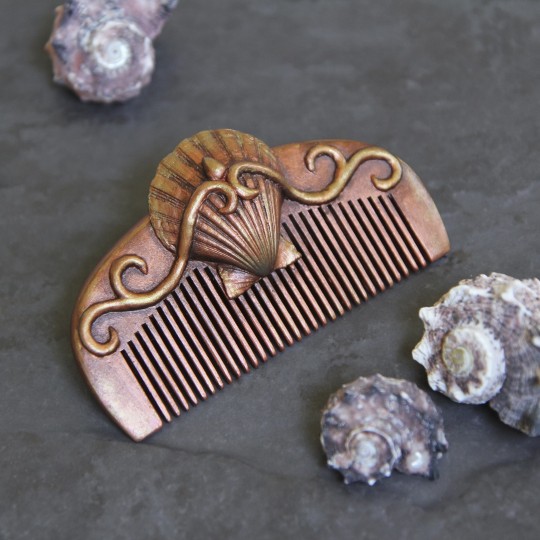
This handmade mermaid comb is currently on it's way to a beautiful mermaid in Singapore. :)
#shell#mermaid#ocean#mermaid hair#mermaid tail#mermaiding#siren#handmade#one of a kind#ooak#hand sculpted#sea shells#ocean vibes#mermaid vibes#summer vibes#faefins#marianne charlotte art#marianne charlotte thompson#pretty#comb#gold#epoxy clay#epoxy sculpt#fairytale
114 notes
·
View notes
Note
What do you think of Rebecca Dickson's essay, "Misrepresenting Jane Austen's Ladies"? As much as I appreciate the art of the 1995 Persuasion and S&S movies, I think Dickson made excellent points--especially about S&S.
Hello, anon!
So, I had to go fish down that book chapter and it wasn't easy XD (I'll link it on notes for anyone interested).
To give everyone else a summary:
- The main thesis of the article is that, while being beautifully crafted pieces, both Persuasion 1995 and Sense and Sensibility 1995 undermine the quiet feminism of those two Austen novels.
- About Persuasion, she says that the portrayal of Elizabeth obscures the suffocating constrictions of gentry women at the time, and eclipses the importance of Mrs. Croft and Anne's speeches and subtle defiance.
- About Sense and Sensibility, she says that the movie flips the script and makes Elinor's restraint into repression and so gives her an arc of emotional liberation that is alien to the book.
- She does mention that the opposite arc for Marianne is still there in the movie... the way it is written sounds a bit inconsistent to me upon a first read, or at least confusing, but she's saying both things.
- Elinor is a complete character that needs no change in the novel.
- The film is not about Marianne's epiphany but about the importance of not being repressed.
- Austen's scene between Brandon and Elinor about Marianne's ingenuity supports Elinor's position in the novel, Brandon's position in the movie.
- Elinor's three outbursts in the movie (Marianne learning of Edward's engagement, Marianne's illness and the reveal that Edward is not married) are a betrayal of the novel's character.
- About Marianne's illness scene, she says that Elinor is promising something to Marianne and apologizing to her (?)
- "America likes its heroines to have no secrets"
- Thompson's translation of Elinor Dashwood has a surprisingly antifeminist element to it. Note that it is the strong woman who breaks, not the immature, malleable one."
- Elinor is dependant of men in the movie (Brandon teaches her about "the wonders of a wilful nature" and the doctor "to prepare herself emotionally for her sister's death")
So... my thoughts?
Re: Persuasion, I don't think anyone disagrees that Elizabeth Elliot is off, but I also think the characterization sticks out like a sore thumb as well. It is out of place within the script and she comes across as disturbed rather than spoiled. I think the criticism is valid, but I don't think it is as dire as the author thinks it is for the audience; ultimately because it is Anne's story and we engage with it in a far more personal --rather than sociological-- way, far more than we do in other Austen stories like Emma or Pride and Prejudice. Persuasion's more romantic vein is the main cause for this.
The author goes in far more detail with her criticism of S&S, and there I disagree more with her.
First there is the underlying claim that S&S is at its core the story of Marianne's maturation and acquisition of sense. I dispute that. I say that S&S is at its core a thesis on what it means to be sensible, and that's why we follow Elinor's pov the closest, and are presented with the contrasts of false sense: being sensible is not being greedy (Fanny) or persuadable (John) or insipid (lady Middleton) or cunning (Lucy) or snobbish (Mr. Palmer) or cold (Mrs. Ferrars). Sensibility is not condemned by itself, but on the pitfalls of its excesses: Sir John and Mrs. Jennings are nosy and unrefined, but it is their open heart and kindness that supports our main characters in their time of need; same goes for Charlotte Palmer's extreme hilarity. Willoughby's problem is not that he's all sensibility, but that he's selfish and self-centered, and the same goes for Marianne and her self-fed misery, and mrs. Dashwood's romantic mind.
I personally think Austen understands virtue in an Aristotelian way, as the golden mean between two extremes that are vices, and I think the paragraph above illustrates this point. It's not a choice between sense and sensibility; it's rather about the way these two things interact to make a balanced, virtuous, flourishing individual. In that light is that we should understand the Elinor-Brandon conversation: Marianne's naivety is dangerous to her and she would be benefited from learning the lessons of experience, but there is some value and beauty to her joie de vivre. That's where Brandon's backstory fits in: he has learned the lesson of the world but it has made him melancholy and that is not a desirable state of things. While I can see that the movie scene does leave the last word to Brandon (because we have not the inner perspective of Elinor), as I'll elaborate below, the movie does not shy from the fact that Marianne's behavior was reckless, wrong, and damaging to herself and her family.
Also, when we are introduced to Marianne we are told twice that she is "sensible and clever", "Margaret... had already imbibed a good deal of Marianne's romance, without having much of her sense".
I don't think Marianne's arc is diminished at all; the movie makes a point to include and let breath the scene where Marianne talks to Elinor and tells her that she compares her own past behavior with Elinor's, with what it should have been. Besides that, we see Marianne taking up her studies and helping at home with Margaret's learning, plus how she goes from only caring about Willoughby --how she's rude to Brandon when he comes to invite them to visit the estate and how she goes out in the rain ignoring her hosts and her sister-- to how she worries about Elinor's feelings when we get to the Lucy's marriage fake-out and how she says that the gift of the pianoforte is not just for her, but for the enjoyment of her family.
The learning the meaning of true love is also even more emphasized than in the novel; Willoughby brings Marianne wild flowers he carelessly picked from the side of the road, whereas Brandon brings her flowers from the hothouse. On the surface the first choice looks fresh and the second boring, but under the surface it was the second one that involves care, effort and perseverance. Same goes for the symbolism of the sonnet: Willoughby can recite it admirably, but Brandon is the one that actually embodies it: it is his love that does not alter when it alteration finds nor removes with the remover to remove, but looks on tempests and is never shaken. Cold Combe Magna gives Marianne it's cold back, while Brandon, worried, searches for her.
As for the "Elinor is a complete character" I think this is a superficial reading of the novel. A lot like Anne, Elinor is forced into loneliness with her feelings by her circumstances. It is not natural for a girl of 19 to be the more mature person to her mother of 40. It is not that Elinor does not need others, specially her family, to sustain her in her emotions and grief; it's that they are unqualified to help her and she cannot rely on them ("From their counsel, or their conversation, she knew she could receive no assistance, their tenderness and sorrow must add to her distress, while her self-command would neither receive encouragement from their example nor from their praise.").
That is a valid criticism of the movie, that the author does not mention because it doesn't fit with their view of Elinor as a complete character: making Elinor an older woman on the verge of spinsterhood makes it more difficult to see how unnatural her situation is. Another element of the novel that shows us that Elinor is still a girl in a way is how she's persuaded and moved by Willoughby's story; she even comes to the point of finding herself wishing that Willoughby were a widower so that he could marry Marianne. When she finally talks to Marianne about Edward's engagement, she tells her that she was several times on the brink of breaking her promise to Lucy.
Also, a lot like Anne Elliot, we could say that Elinor 'was forced into prudence in her youth, and learned romance as she grew older, the natural sequel of an unnatural beginning'; the key here is a chance in circumstances that allows Elinor a more healthy dealing of her feelings. So I'll concede half a point here to the author: Elinor perhaps has nothing to learn internally, but her situation is not ideal or desirable by any means, so we as readers/audience, I think, are meant to root for a change in circumstances that allows her more freedom of expression. Which leads us to Elinor's three outbursts in the movie, that the author criticizes as "breaking" Elinor.
So, there's the old adage of cinema, show, don't tell. Showing the emotions and thoughts of a character that is not manifestative in a novel setting is very difficult. The most common strategy to deal with this is the voiceover, be it played straight or as the reading aloud of letter writing or diary entries. It is kind of generally frowned upon, though I think it is unjustified. So... how do we convey a character's inner feelings when we don't have either narration or voiceover? The outbursts are at play in 1995, but consider the framing:
- The first one is not internally but externally driven: it's not that Elinor comes to a breaking point, but that she's finally allowed to talk about her grief because she's no longer bound to secrecy. It is important that Marianne understands how deeply Elinor feels about the situation, and we as the audience need to be shown both things. Notice that in this scene Elinor and Marianne are alone. Unlike Marianne's public grief, Elinor's is only expressed in intimacy with her family.
- The second one is meant to show us how deeply Elinor loves Marianne, despite of how different their characters and tempers are. It is important for the audience to see that Elinor's endurance is the fruit of effort rather than a naturally detached disposition. I don't see either the apology or the promise that the author sees here: "Marianne, please, try... I cannot... I cannot... I cannot do without you. oh, please, I have tried to bear everything else... I will try... but please, dearest, beloved Marianne, do not leave me alone". Once again, this demonstration of grief is private: Elinor and an unconscious Marianne.
The argument of Elinor's dependance on the doctor is forced and silly. It's narrative function is to tell the audience that Marianne is in danger of dying. And in any natural situation, it'd be silly to say that a doctor giving someone a diagnosis depowers the person.
The third outburst is another change in circumstances, not in the character herself: Edward has come to visit them and tell them he's not married. In that moment it is clear what his intentions are and what is about to happen. Elinor is finally allowed the relief of her feelings and the expression of her joy. The author says that Austen gives Elinor the privacy of her outburst, but that's something you can do in a novel that you cannot do in a movie. Yes, Austen doesn't show us Elinor crying in detail, but she's telling us she does, which leads us to imagine her crying. The privacy is illusory, and removing the display of emotion is cheating the audience from this cathartic moment. Once again, Elinor's manifestation of emotionality here is still private, in the context of her family.
So, no, I don't think that the movie breaks Elinor, or changes her instead of changing Marianne, or makes violence to the message and themes of the story.
Thank you for the ask!
62 notes
·
View notes
Text
“SENSE AND SENSIBILITY” (1995) Review
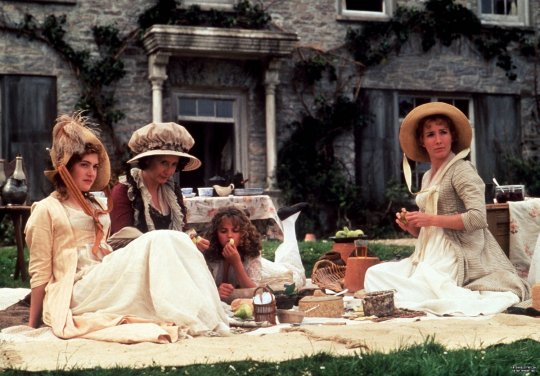
"SENSE AND SENSIBILITY" (1995) Review
The year 1995 saw the beginning of an onslaught of Britain and the United States’ love affair with British author, Jane Austen. A love affair that has not abated after twenty-three (23) years. In 1995, the BBC aired Andrew Davies’ miniseries adaptation of Austen’s most famous novel, ”Pride and Prejudice”. And later that year, Hollywood released its adaptation of another Austen, ”Sense and Sensibility” - which I had just recently watched.
Directed by Ang Lee, ”SENSE AND SENSIBILITY”, starred Emma Thompson (who also wrote the screenplay), Kate Winslet, Alan Rickman and Hugh Grant. The story centered around Elinor (Thompson) and Marianne (Winslet), two daughters of Mr. Dashwood (Tom Wilkinson) by his second wife (Gemma Jones). They have a younger sister, Margaret (Emilie François), and an older half-brother named John (James Fleet). When their father dies, the family estate passes to John, and the Dashwood women are left in reduced circumstances. The story follows the Dashwood sisters to their new home, a cottage on a distant relative's property (Robert Hardy), where they experience both romance and heartbreak. The contrast between the quiet and sensible Elinor and the extroverted and occasionally impetuous Marianne is eventually resolved as each sister finds love and lasting happiness. This leads some to believe that the story’s title described how Elinor and Marianne find a balance between sense and sensibility in life and love.
Producer Lindsay Doran made an excellent choice in selecting Lee to direct the film. First of all, he drew some excellent performances from his cast - especially from Thompson, Winslet, and Rickman. Lee also effectively drew filmgoers back into Regency England without allowing the film to resemble some kind of stiff painting or a museum piece. Although he initially had trouble with dealing with Western-style of filmmaking – especially in dealing with British cast members who questioned his direction and made suggestions regarding shots. He could be rather authoritarian with the cast, especially with Hugh Grant. The actor ended up calling him ”the Brute” behind his back. But Lee and the cast eventually got used to each other. Lee was also responsible for insisting that Thompson play the oldest Dashwood sister. And he Lee ordered Winslet to read poetry and novels from the late 18th century and early 19th century in order to get her to connect to Marianne’s romantic nature. And to give the movie its emotional core, he asked both Thompson and Winslet to room together during production. The two actresses remain close friends to this day.
Not only was Lee ably assisted by his superb cast, but also by crew members such as costume designers Jenny Beavan and John Bright, production designer Luciana Arrighi, set decorator Ian Whittaker, art directors Philip Elton and Andrew Sanders; and cinematographer Michael Coulter, whose photography beautifully captured the English countryside in all of its glory. I especially have to give kudos to Coulter’s photography and Arrighi’s production design for a beautiful re-creation of Regency London. I also enjoyed composer Patrick Doyle’s score for the film. His use of John Dowland’s song, "Weep You No More Sad Fountains" as Marianne’s own theme song struck me as very impressive. But I have to especially give kudos to Emma Thompson for her marvelous adaptation of Austen’s novel. It may not have adhered exactly to the novel, but I found it well written, lively and paced just right.
With the exception of two performances, I felt more than impressed with the cast. When Ang Lee had signed on as the movie’s director, he immediately suggested that Emma Thompson portray the oldest Dashwood sister, Elinor. Thompson considered herself too old for the role, considering that Elinor was at least 19-20 years old in the novel. But Lee suggested that she increase Elinor’s age to 27 in the screenplay, which would also make her distress at being a spinster easier for contemporary audiences to understand. Frankly, I feel that Lee made a good choice. Emma Thompson gave a superb performance as Elinor Dashwood, whose practical mind led her to act as the family’s de facto leader, following her father’s death. She also brilliantly conveyed Elinor’s emotional nature behind a mask of reticence via her eyes and various expressions. Kate Winslet had no need to be subtle as the more openly emotional Marianne Dashwood. Winslet was at least 20 years old when she filmed ”SENSE AND SENSIBILITY’. Yet, even at that tender age, Winslet proved that she had the talent and acting chops to portray the very complex Marianne. And yet, she managed to convey all aspects of Marianne’s personality – romantic, willful, emotional and sometimes a bit self-involved - with surprising subtlety.
I found Alan Rickman impressive as one of the Dashwoods’ new neighbors, the quiet and dependable Colonel Christopher Brandon. I enjoyed the subtle manner in which Rickman expressed Brandon’s reluctance in expressing his love for Marianne, due to her feelings for another man. That other man proved to Greg Wise, who gave a surprisingly effective performance as the dashing, yet rakish John Willoughby. Wise has always struck me as a solid, but not particularly an exceptional actor, but I must admit that I consider Willoughby to be among his best performances. The movie’s supporting cast also included Robert Hardy and the late Elizabeth Spriggs, who gave amusing performances as Sir John Middleton, the Dashwoods’ cousin and benefactor; and Mrs. Jennings, Sir John’s mother-in-law. Gemma Jones was excellent as the emotional and sometimes girlish mother of the Dashwood sisters. I was also impressed by Harriet Walter, who portrayed the sisters’ shrewish sister-in-law, Fanny Dashwood. And Hugh Laurie gave a hilarious performance as the sardonic and long-suffering Mr. Palmer, Mrs. Jennings’ other son-in-law. And I must say that Imogen Stubbs also impressed me by her subtle performance as the cunning and manipulative Lucy Steele, who seemed to have a claim for the same man that Elinor Dashwood longs for.
Speaking of Elinor Dashwood’s love, I finally come to the two performances that had failed to impress me. One of them belonged to Hugh Grant. He portrayed Edward Ferrars, one of Fanny Dashwood’s brothers that happened to be in love with Elinor and is claimed by the manipulative Lucy Steele as her fiancé. Remember his charming, yet modest performance in the hit 1994 comedy, "FOUR WEDDINGS AND A FUNERAL"? Well, his Edward Ferrars turned out to be an early 19th century version of that particular role. Grant simply gave the same performance, but with more stuttering and well . . . the same charm. What had been fresh and original in 1994, ended up as old news a year later in "SENSE AND SENSIBILITY". Fortunately, he managed to create strong chemistry with both Thompson and Emilie François, who portrayed the young Margaret Dashwood. And he managed to inject a good deal of subtle wit into his portrayal of the low-key Edward. But the one performance that really did nothing for me belonged to Imelda Staunton. She portrayed Charlotte Jennings Palmer, Mrs. Jennings’ daughter and Mr. Palmer’s wife. Now I am a fan of Stauton, but I cannot say the same about her portrayal of Charlotte Palmer. I realize that the character was supposed to be annoying, but one could say the same about Sir John and Mrs. Middleton. But whereas I found Robert Hardy and Elizabeth Spriggs’ performances amusing and rather funny at times, Staunton’s slightly over-the-top portrayal of Charlotte Palmer ended up irritating the hell out of me.
I understand that Andrew Davies had produced his own version of the Austen novel back in 2008. I cannot deny that the three-part miniseries is first rate. There are two other adaptations of Austen's 1811 novel that I have enjoyed. However, I still believe that this particular version is superior. It came as no surprise to me that it earned seven (7) Academy Award nominations and won one (1) for Thompson’s Adapted Screenplay. ”SENSE AND SENSIBILITY” is one movie I could watch over again without ever getting tired of it.
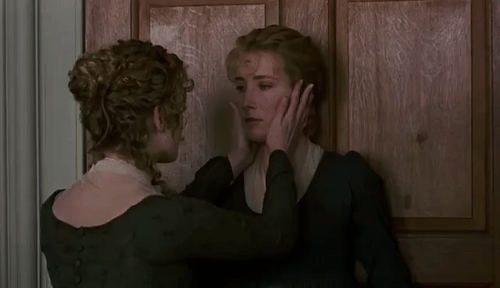
#jane austen#sense and sensibility#sense and sensibility 1995#ang lee#emma thompson#kate winslet#alan rickman#hugh grant#greg wise#gemma jones#emilie francois#elizabeth spriggs#robert hardy#harriet walter#james fleet#imelda staunton#hugh laurie#imogen stubbs#period drama#costume dramas#elinor dashwood#marianne dashwood
3 notes
·
View notes
Text
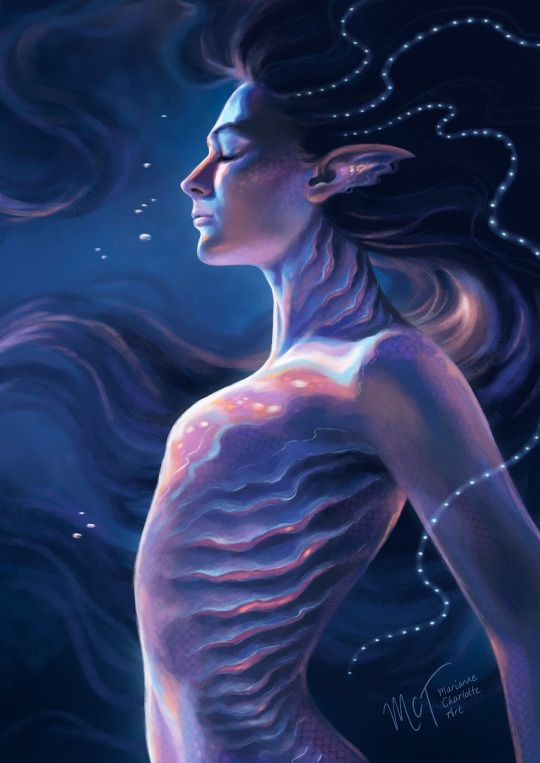
It's MerMay again, so I'm kicking off the month with this mermaid painting - she's drifting in the dark waiting for ships to sink and sailors to drown. 🧜♀️
#mermaid#mermay#mermay2022#mermaidtail#mermaid hair#mermaid tail#siren#mermaid painting#mermaid art#mermaid artist#marianne charlotte art#marianne charlotte thompson art#realistic mermaid#fantasy art#concept art#wacom art#wacom cintiq#wacom painting#evil siren#fairy#fairytale#underwater#digital art#digital painting#the little mermaid
426 notes
·
View notes
Text
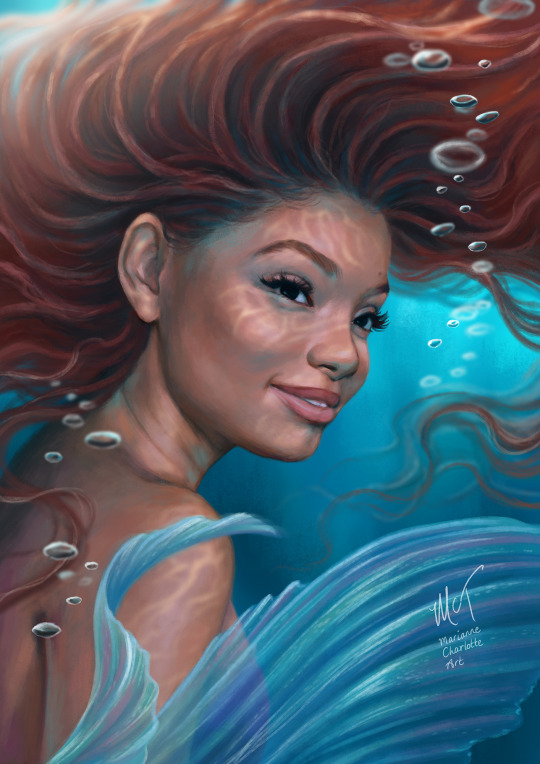
And here is my latest painting! Who else can't wait for Halle Bailey to flip her fins in the new Little Mermaid movie?
#mermaid#the little mermaid#ariel#ariel disney#disney#halle bailey#halle bailey little mermaid#little mermaid fan art#ariel fan art#fan art#painting#digital art#digital painting#disney art#disney painting#marianne charlotte art#marianne charlotte thompson art#wacom art#wacom painting#photoshop art#photoshop painting#disney fan art#halle bailey ariel#mermaid tail#mermaid hair#mermaid painting#concept art#wacom cintiq#halle bailey mermaid
127 notes
·
View notes
Text

Neytiri! This one took ages to paint! I went to the cinema to see 'Avatar: The Way of Water' and was a bit disappointed. It is a stunningly beautiful film, but the plot was a bit weak (oh no, the bad guy is back again!), and Neytiri did not have enough screen time.
#neytiri#avatar#the way of water#neytiri fan art#avatar the way of water#fan art#painting#digital art#wacom art#wacom painting#digital painting#neytiri painting#neytiri art#avatar painting#fantasy art#marianne charlotte art#marianne thompson artist#marianne charlotte thompson art#marianne art#portrait painting
33 notes
·
View notes
Text

Grogu want the eggs so bad!
I cackled with laughter watching this scene, so I just had to do a painting!
#baby yoda#grogu#baby yoda art#grogu art#the mandalorian#the mandalorian fan art#art#cute#marianne charlotte art#marianne charlotte thompson art#star wars#the force#jedi#star wars fan art#baby yoda memes#frogs#painting#photoshop painting#cute art#fan art#mandalorian fan art#artwork#realistic art#baby yoda painting
153 notes
·
View notes
Text

Another MerMay painting I've just finished! This time it's a siren luring a poor lad to his death.
#siren#mermaid#mermay#mermay2021#evil siren#evil mermaid#dark siren#mermaid art#mermaid artist#mermaid painting#marianne charlotte art#marianne charlotte thompson art#concept art#painting#realistic mermaid#underwater art#underwater painting#pretty#the little mermaid#mermaid tail#mermaid scales#fantasy art#elf ears#fairytale art
49 notes
·
View notes
Text
Happy Halloween everyone! Here is a creepy vampire mermaid I speed painted.

#mermaid#vampire#siren#spooky#creepy#beauty#digital art#digital painting#dark mermaid#blue hair#mermaid tail#marianne art#marianne charlotte art#marianne charlotte thompson art#artist#painting#underwater#fairytale#fairy#fantasy#faerie#pretty#eyes#portrait#original character
26 notes
·
View notes
Text
Something I drew for a 'draw this in your style challenge' - original character by Sylessae.

#elf#night elf#moon#fairy#art#painting#purple hair#sparkles#stars#digital art#my art#magical#portrait#marianne art#marianne charlotte art#marianne charlotte thompson art
15 notes
·
View notes
Photo

I have written a book!
It went to print yesterday but doesn’t publish until November. I thought I would show a little taster of what is to come!
For more updates you can follow me here:
Facebook: www.facebook.com/mariannecharlotteart
Twitter: @MCT_art
Instagram: @mariannecharlotteart
#mermaid#mermaids#mermaiding#mermaid life#mermaid life style#mermaids are real#magic#mermaid magic#sneak peak#fairytale#book#publishing#author life#writer#writer life#my book#my art#creativity#marianne charlotte art#marianne charlotte thompson art#marianne thompson author#marianne charlotte thompson author#artwork#pretty#bokehphotography#photography#bokeh photography#blue#ocean#sea
3 notes
·
View notes
Text

My art vs artist panel for 2019 - I'm a bit late posting because my internet has been a bit wobbly.
#artvsartist#artvsartist2019#art#fantasy art#artwork#my art#artist#marianne thompson art#marianne charlotte thompson art#marianne charlotte art#painting#digital art#traditional art#mermaid#fairy#dragon#colourful#fantasy#fairytale#selfie#me
6 notes
·
View notes
Text

So I finally got around to finishing this Witcher fan art! I loved the snowy scenes and cold, bluish lighting in the second series - it was just calling out to be painted!
#geralt#geralt of rivia#the witcher#witcher fan art#henry cavill#henry cavill witcher#henry cavill geralt#white wolf#the witcher netflix#art#painting#wacom art#photoshop art#photoshop painting#marianne charlotte art#marianne charlotte thompson#fantasy art#digital painting#ciri#yennefer#portrait painting#artist#wacom painting#fan art
3K notes
·
View notes
Text

Some kind of crystal elf - I've had this painting in my unfinished wips folder for so long. I can't believe I actually got around to finishing it. 😀
#elf#crystal elf#elf ears#elf art#fairy art#fairy painting#crystals#fantasy art#concept art#wacom art#photoshop painting#digital art#wacom painting#mermaid#mermaid art#fantasy artist#marianne charlotte art#marianne charlotte thompson#pretty art#pretty fairy painting#moon#original character#character artist#fantasy concept art#sparkly art#glow#blue hair#blue eyes#space art#moon fairy
91 notes
·
View notes
Text

Happy Halloween, everyone! I couldn't resist painting a fan art of Tom Hiddleston from the moody vampire film 'Only Lovers Left Alive'.
#tom hiddleston#only lovers left alive#vampire#halloween#spooky season#spooky vibes#vampire film#halloween art#spooky art#tom hiddleston painting#tom hiddleston loki#loki#halloween 2021#painting#art#marianne charlotte art#marianne charlotte thompson#digital art#wacom#wacom art#digital painting#photoshop painting#vampire art#vampire aesthetic#vampire painting#portrait
139 notes
·
View notes